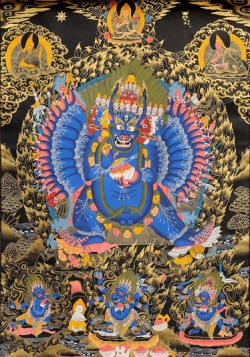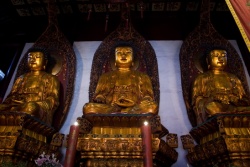Nat Worship in Myanmar
The word Nat in Myanmar is commonly used for both celestial and terrestrial Gods. We need to differentiate between the celestial Gods and the terrestrial Gods. The terrestrial Nats are only spirits or Ghosts who were given a dedicated region for his or her sovereignty of guardianship. Earth bound Nat worship is sometime defined by some scholars as Animism. According to the Pali Canon and the Jataka stories, the most prominent one was the story of Sujata, the Brahmin lady who offered milk rice porridge to our Bodhisatta Gotama at the time when he was about to attain self-enlightenment. She took Bodhisatta Gotama who was resting under the tree to be the tree God who had appeared in person to accept her reward of fulfilling her aspiration of her marriage to a husband of her own choosing and a first born son. Thus, worshiping Nats was recorded in the chronicle of the history of Buddhism in Pali Canon.
In pre-Anawratha time in Myanmar, Mahayana Buddhism, Hindu Gods, Nat worship, tree Gods, mountain Gods and Village Gods – were the prevailing beliefs in the royalty and its subject. After the introduction of Theravada Buddhism to Bagan by Shin Arahan of Thaton (Mon state), king Anawratha integrated all kinds of worship into the Theravada practices. Since that time, the number of anointed Nats has grown to 37 Nats to this day. Many of them were individuals met with tragic death, except Sakka, the king of Devas from Tavatimsa as head of the Nats...
Indra, the Hindu God, the king of Gods from Tavatimsa heaven, was proclaimed by the king Anawratha to head the anointed thirty six Nats. Indra is the God of heaven of all devas in heaven and earth. He is one that was mentioned almost in Pali Canon. He has nothing to do with terrestrial Gods (Nats) originated in Myanmar. It is wrong to assume that Sakka is the Nat of Myanmar; because he is the Hindu God and by is own merit has gained a place as the king of Devas in Tavatimsa heaven. Tavatimsa heaven was the place where our Lord Buddha had gone for 3 months to deliver the Abhidhamma, the Discourse to Gods. He is the custodian of Buddha Gotama dispensation (sasana) in the period from 2,500 BE to 5,000 BE. Every New Year people in Myanmar will welcome him believing that he will descend to earth to see the welfare of the people.
The house God
Actually, many Buddhists in Myanmar, most rural villagers, worship the Lord Buddha, Gotama Buddha as well as Nats. Worship of Nats can be found everywhere. Many of the households have as a tradition offer Coconut stringed in cane basket hanging inside their house as an offering to Minmahagiri Nat otherwise known as house god to guard against evil spirits. The gang of assassins in 1947, who killed Myanmar martyrs including Bo Gyoke Aung San, used Minmahagiri Nat’s blessing by tying red/white ribbon to their cars for a successful attempt to kill members of Parliament at their Parliamentary session.
The Village God
In villages across Myanmar, it is a village tradition to present the one to be novitiate (as novice or Shin Laung) to the Village God. The village God is usually placed in a tree shrine on a big tree, on the main road crossing the village. This ceremonial is conducted in every novitiate to protect him from disturbing spirits during his stay at the monastery. This is one instance of the integration of Nats worship into Buddhist Theravada practices.
Shwe Nyauang Bin Nat
The God of the road, Shwe Nyaung Bin Nat, is the most popular Nats among those who owned vehicles in Yangon. Almost all who owned vehicle will not dare to use the vehicle without presenting their vehicle to Shwe Nyaung Bin Nat for his blessing. A red/white ribbon will be tied to the vehicle as a symbol of his blessing for safe driving. He is the one Nats that will keep the vehicle running safely and free of accident. The red and white ribbon is a license for safe driving given to the vehicle by Shwe Nyaung Bin Nat. Believe it or not, this tradition has been accepted and practiced for decades...
The Salt Water River God
Living in the delta region like Yangon, people must at times, take ferry boats to go places. Many believed that making a small offering to U Shin Gyi Nat (the salt water river God) the river God in the delta region will keep the river travelers safe and ensure a safe return. U Shin Gyi Nat is usually depicted as riding an alligator and is considered the supreme Nats in the delta region. It is known to most living in this delta region that he is the most potent Nat looking after the safety of river travelers. Spirit possession is one way of showing his blessing is received to the donor.
The two brother Nats
The rowdiest of all Nats are the two brothers – Shwe Phyin Gyi and Shwe Phyin Lay or also known as Min Gyi and Mingalay Nats. The two Nats will usually pick their spirit brides from among those who have close affinity to Nat. Many parents who have daughters are afraid to go near their shrine during the festivities for fear of being picked by the two brothers as their bride. When a girl is picked, the girl would be possessed off and on by them. This girl will have a certain supernatural power to predict fortune and could either use their power to provide charms for good fortune. Merchant and business people will consult Natgadaw to charm or talisman for good business. She is also capable of casting evil spell to people for a small fee. The girl for life is in their possession and is called Natgadaw, the spirit medium, the bride of a Nat.
On fees for service Natgadaw could use her supernatural power to do evil deeds such as to cast an evil spell on people. She could also provide charm of good fortune to people. In the west, they would be known as Voodoo spiritual medium. Natgadaws are not quite equivalent to Shaman. Sharman are white magician, seldom perform evil deed. They are counter to those evil doers. They are religious holy man or ascetic monk who practices Jhanas meditation. They possess are the highest power in relation to celestial Gods and generally provide remedy to erase evil spell castes on an individual. The Sharman are called Holy saint or Bodaw. Monk, who practices Jhanas or, Samatha Bhavana, is most sought after by lay Buddhist.
Many who had experienced in dealing with Nats will tell you that – in Myanmar , though most of them are Buddhist of Theravada sect many would respect Buddha, Dhamma and Sangha, they do fear the earth bound Gods (Nats). They fear them because Nats could be a nuisance living in this mundane world. There are people who worship and revere celestial Gods or Goddess for protection and among them are: Indra, Saravasti (Tuyatadi), Siva, Ganesh, Sandi Devi and Vishnu. So we have two kinds of Nat worship: worship celestial Gods for protection and blessing; and worship terrestrial Gods (Nats) for fear of their disturbance.
Posted by Maung Paw


